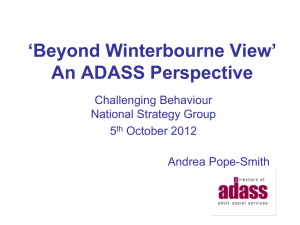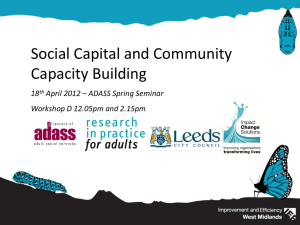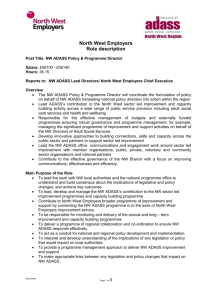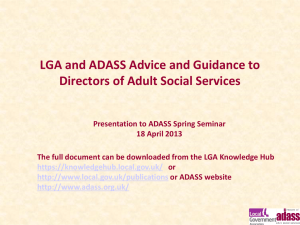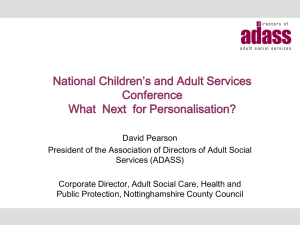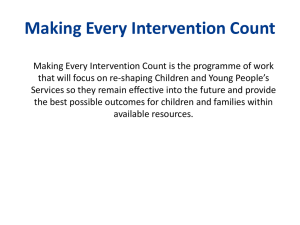Association of Directors of Adult Social Services
advertisement
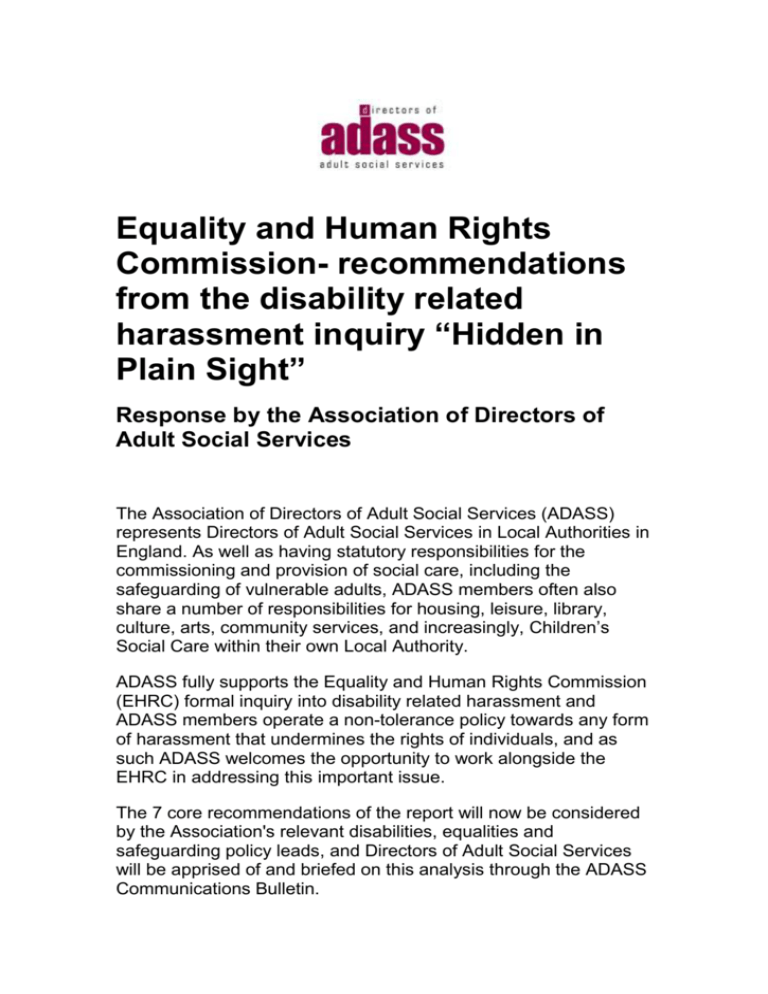
Equality and Human Rights Commission- recommendations from the disability related harassment inquiry “Hidden in Plain Sight” Response by the Association of Directors of Adult Social Services The Association of Directors of Adult Social Services (ADASS) represents Directors of Adult Social Services in Local Authorities in England. As well as having statutory responsibilities for the commissioning and provision of social care, including the safeguarding of vulnerable adults, ADASS members often also share a number of responsibilities for housing, leisure, library, culture, arts, community services, and increasingly, Children’s Social Care within their own Local Authority. ADASS fully supports the Equality and Human Rights Commission (EHRC) formal inquiry into disability related harassment and ADASS members operate a non-tolerance policy towards any form of harassment that undermines the rights of individuals, and as such ADASS welcomes the opportunity to work alongside the EHRC in addressing this important issue. The 7 core recommendations of the report will now be considered by the Association's relevant disabilities, equalities and safeguarding policy leads, and Directors of Adult Social Services will be apprised of and briefed on this analysis through the ADASS Communications Bulletin. Whilst ADASS agrees in principle with those recommendations relevant to Local Authorities, implementation is a matter of local discretion by Local Authorities and their relevant partners. It is also important to note the economic context and the immense financial pressures on Local Authorities as a result of government spending cuts, amounting to approximately 28% reductions in support grant during the current 4-year period. All the recommendations in effect enhance existing processes and services for dealing with disability-related harassment, and further development will always be within existing resources as these allow. Further, it important to note that in many cases local authorities can build and strengthen upon existing good practice requirements and Local Adult Safeguarding Boards and Community Safety Partnerships (formerly Crime and Disorder Reduction Partnerships) will be major vehicles by which Local Authorities exercise their local leadership role in this area. The recommendations related to information provision and awareness raising are considered likely to be particularly effective. Where there are or have been significant failings in dealing with disability-related harassment, or 'hate crime', it is often compounded by a lack of identification or recognition of the disability issues, which in turn leads to delay or failure in triggering the appropriate responses from partner agencies. Independent advocacy for disabled people can be provided by Local Authorities, largely through third-sector organisations such as Centres for Independent Living, and is also increasingly available as part of the 'universal offer' of Information, Advice and Guidance, which is integral to the social care agenda of personalisation, health and wellbeing. This is not to say that availability should not be improved and where necessary targeted towards disabled people who are victims of harassment or at risk of becoming so. Institutional harassment has been particularly difficult to address, and has clearly not yet been eradicated, as recent inquiries have demonstrated. There needs to be an improvement in the monitoring of institutional care arrangements, particularly where services are geographically remote or isolated from the Local Authority commissioning those services. As part of the ADASS commitment to sector-led improvement, we believe there is real scope for more sophisticated commissioning and monitoring of outcome based contracts and agreements, building upon the progress already made by Adult Social Care in this area. The review of eligibility criteria to increase social interaction and reduce social isolation would be a matter for local determination and interpretation within the current framework of Fair Access to Care Services, although this could carry resource implications. Nevertheless, this is very much a core element of the 'prevention' agenda, and independently of the desirability of such broadening of criteria, there is increasing evidence of the cost-effectiveness of socially-inclusive approaches in tackling future dependency whilst addressing improved health and wellbeing outcomes. The greater engagement of GPs in partnerships and commissioning consortia is likely to enhance the potential for strengthening responses to the alerting process within primary care services. Many NHS trusts have their own safeguarding committees, which complement the work of the Local Adult Safeguarding Boards, and Accident and Emergency Departments are recognised as key areas in the identification of safeguarding issues. February 2012
